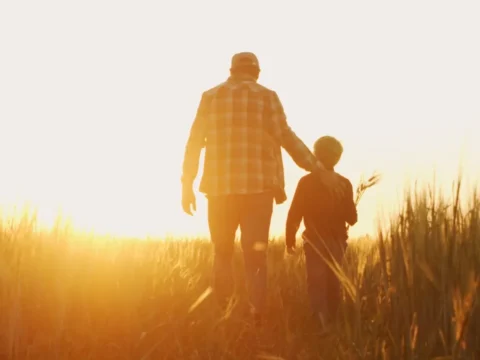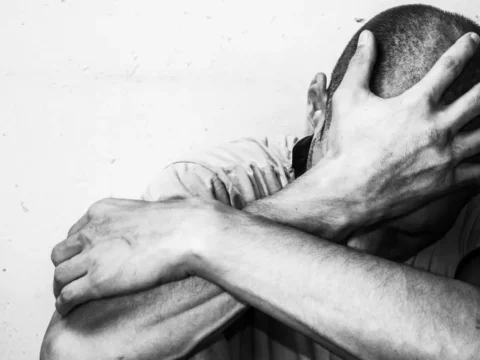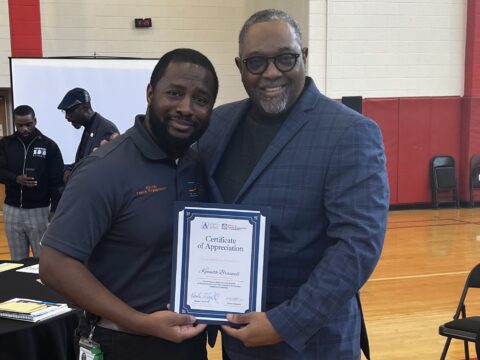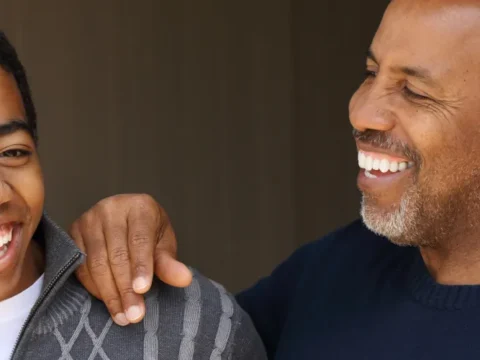By David C. Miller, Ph.D., Fathers Incorporated
The first time your baby’s fingers curl around yours, the world both expands and narrows. It expands because love reveals rooms in your heart you didn’t know existed. It narrows because every decision suddenly feels heavier, more consequential. This mix — wonder and weight — is normal.
New fatherhood is a rollercoaster, and it’s okay if some days feel like you’re clenching the safety bar with both hands. Your mental health isn’t separate from this ride; it is the seatbelt that keeps you in the car.
Here’s a truth too many men don’t hear: A lot of new dads struggle emotionally in the first year. Research shows that roughly one in four new fathers experiences symptoms of depression or anxiety. And while we don’t carry the baby or breastfeed, scientific studies indicate that our bodies still undergo fundamental hormonal shifts that can make us more sensitive, irritable, or flat than usual.
None of this makes you weak or “less of a man.” It makes you a father whose chemistry and circumstances are changing — fast. Naming this reality is the first step toward handling it.
In my work with young dads, I witness a tug-of-war. You’re finishing school or training, figuring out work and housing, stretching your dollars, and learning to be a new parent. It’s a lot all at once, but it’s also possible. You can do this — one decision, one conversation, one small habit at a time.
Start by treating self-care as non-negotiable, as detailed in our recent brief: “Taking Care of Your Mental Health: Tips for Young Dads.” Try to move your body daily, drink water, eat as well as your budget allows, and protect your sleep like it’s an appointment with your child, which, in a way, it is. These basics don’t solve everything, but they change the slope of the hill.
Dads’ well-being ripples. When fathers prioritize their physical and mental health, their children benefit. When parents communicate and co-parent with respect, children tend to thrive. If you and your child’s mom disagree (and you will!), practice pausing before reacting. Speak to each other the way you want your child to speak to others. Little ears are always taking notes.
If your mood feels stuck — anger that won’t cool down, sadness that won’t lift, anxiety that pins you to the mattress — talk to someone. Just as we practice for a trade or a sport, counseling helps us develop mental and emotional skills for partnerships, parenting, and work. Asking for help early beats waiting for a crisis every time. Build your circle on purpose. Put three names in your phone under “lifeline” (a trusted friend, a family member, and a father you respect) and tell them what that label means.
If you live in a rural community, where services can be far apart and privacy concerns feel bigger, know that you are not alone. Depression and suicide rates are higher outside the city, and access to care is often tougher — another reason to create support on purpose. Virtual fatherhood groups, mapped local resources, and small steps like one phone call or one meeting can change the week.
The “Navigating the Backroads” section of our brief outlines practical tips for rural dads — from finding online groups to utilizing one-stop career centers and remote work options. These tips can be life-saving and assist dads with navigating everything from coping with financial challenges to overcoming the dangers of isolation and loneliness, which often lead to depression.
Keep investing in your future. Every credential you earn, every trade skill you add, widens your options and reduces stress. Be realistic about time; say yes to what matters most and ask for help with the rest. None of us parents alone, not in the moments that count.
And please, use us. Fathers Incorporated and the National Responsible Fatherhood Clearinghouse (NRFC) exist for you. Here’s how you can start your self-care journey as a young dad:
- Explore the NRFC Program Map to find local fatherhood services.
- Call the NRFC Help Center at 1-877-4-DAD-411 or email Help@FatherhoodGov.Info with questions.
- Download free resources like Navigating the Fatherhood Lane: Tips for Young Dads and Mental Health Tips for Young Fathers, and keep them handy for the late-night moments when you need a steady voice.
The “For More Information and Support” page in the mental health brief consolidates these and other resources into one place, allowing you to transition from stress to actionable steps.
If you’re reading this in a tough hour, take this single action today: Tell one person the truth about how you’re doing. If you’re feeling unsafe, call or text 988 right now. If you’re steady but stretched, schedule that doctor’s visit, message that counselor, or text one of your lifelines.
Tiny acts compound. Your mental health matters, not just because it keeps you standing, but because a child is learning from the way you care for yourself.
New fatherhood is loud with responsibility and bright with joy. Both are real. You won’t get everything right, but that’s okay. Be present. Be patient with yourself. Ask for help. Keep going.
Your child doesn’t need a perfect dad; your child needs you — healthy, growing, and here.
*
Dr. David Miller is a founding fellow of the Moynihan Institute for Fatherhood Research and Policy.
















